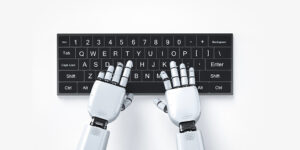Share
Stories and projections about Artificial Intelligence have taken the workforce on a rollercoaster of emotions. In the era of ChatGPT and AI software, employees see the real-world power of AI in the workplace, even in creative tasks like artwork. But when it comes to AI in general, it is safe to say that feelings are . . . mixed, with AI anxiety increasing amongst workers.
- Over 90% of workers already used AI for work tasks
- 81% believe that AI allows humans to focus on higher-value work
- 60% are concerned about the speed of AI adoption
- 75% are worried about pay cuts or jobs becoming obsolete
Some generations are more open to new technology, and others are more skeptical. From HAL 9000 to Skynet, each generation has its own cautionary tales about the dangers of AI.
Gen Z is more technologically advanced, yet they share some of the uncertainty of Baby Boomers when it comes to AI. Gen X and Millennials are generally more open to adopting AI technology, seeing the danger of falling behind. Committed to their careers and unprepared for retirement, Gen X and Millennials cannot afford to ignore technology that’s already being widely adopted.
Employers have to take the initiative in learning about the uses, benefits, and best practices for AI in their industry. When you have a specific policy and boundaries, your transparency can mitigate worker anxieties about layoffs and other unknowns.
What happens when AI anxiety goes unaddressed?
Better than most executives, your workers know that revolutionary technology has its upside and downside. The early headlines about Generative AI made it sound like AI was quickly going to replace a lot of human jobs.
57% of people indicate that they would have greater trust in AI if they had more visibility into how it is used (source: Salesforce)
Employers and managers may not want to deal with the complexities of AI, but it’s already impacting productivity. Workers are using generative AI on their own, and it’s up to employers to establish appropriate guardrails for quality control and ethics.
Now that AI is the elephant in every boardroom, employees will get paranoid if you can’t talk openly about your company’s approach. If your company remains silent, then some conclude that their jobs are being automated out of existence ASAP. Others will worry that the company is destined to fail, allowing competitors to reap the benefits of this transformative technology.
Top causes of AI anxiety & concerns
Not knowing how to use AI: Like your grandma on TikTok – just “using” technology doesn’t mean you’re doing it right.
Job security/displacement: Machines have been replacing manual laborers since the industrial revolution, but AI poses a new kind of threat to office jobs.
AI technology is expected to create 12 million more jobs than it is expected to replace (source: Forbes Advisor)
Legal implications: As AI creeps into decision-making for management (and even healthcare), who will be held liable for the mistakes?
Ethical considerations: UNESCO’s recommendations for ethical AI are a bit more complicated than Asimov’s “Three Laws of Robotics.”
Cybersecurity: AI opens up new possibilities for ransomware attacks, and HR departments need to protect sensitive data.
Quality & trustworthiness: Two thirds of workers are concerned about the quality of AI.
Easing AI anxiety while creating a culture of innovation
You can’t let your company fall behind on key technology, or else the struggle to compete will endanger everyone’s job. Instead of ignoring or shunning AI, you need to decide on a safe and ethical way to take advantage of what’s available.
Transparency & communication: If you can prepare for AI adoption (and you should), then it’s much easier to explain your company’s AI policies as they’re developed. Make sure to include stakeholders from all levels of the company to reduce blind spots and give everyone a voice.
Commitment & alignment: Does your company value service and employees? Employees will see your values and priorities displayed in how you implement AI solutions. When new payroll software automates a laborious HR task, those work hours can be redirected to more fulfilling work.
Training & continuous learning: Keep your workers up to date on AI-related policies and the best ways to take advantage of new tools. Unlock the potential of generative AI by learning about the available settings and implications. Track completion of new courses with a Learning Management System (LMS).
Embracing & encouraging: Science fiction and clickbait news have given us plenty of nightmare fuel. Without ignoring the dangers, your company can set a positive tone by emphasizing the ways AI can benefit your workforce. Encourage performance and innovation while renewing your commitment to the human beings at your company.
Feedback & adaptability: This emerging technology is rapidly evolving, and you’ll inevitably need to make adjustments with AI at your company. Get employees engaged with the process of optimizing and improving processes, not just waiting for instructions.
Discover how Netchex can help your HR department explore the power of AI:
Industry news & tips sent straight to your inbox!
Enter your email below to subscribe to industry news, product updates, and tips.
Related articles

Introducing HR Reporting with AI that Can Actually Impact Your Bottom Line

What is HR AI and How It Can Help Achieve Your Strategic Goals

The Future of Work is Here: Netchex Unveils Industry-First AI Solution for HR

